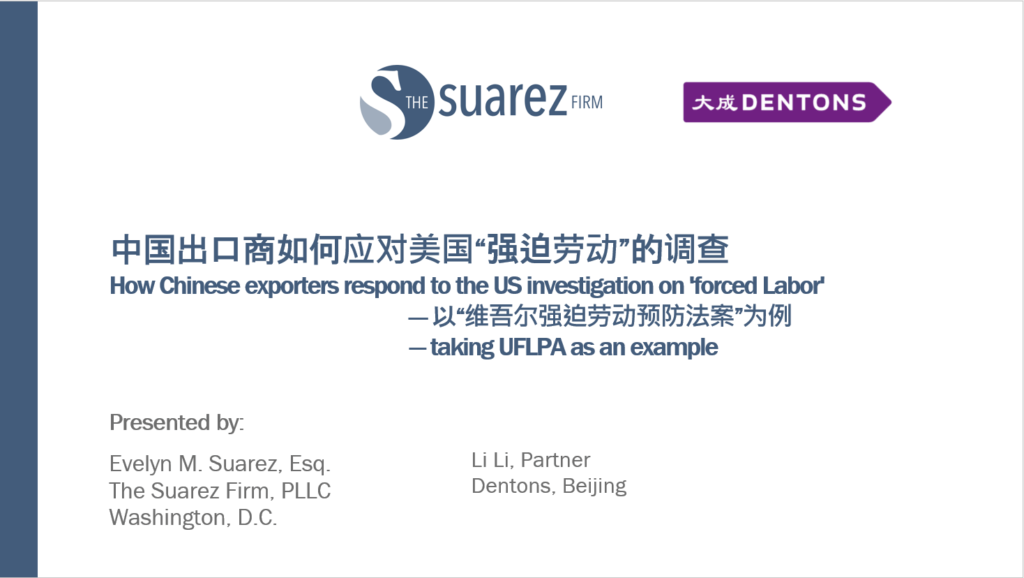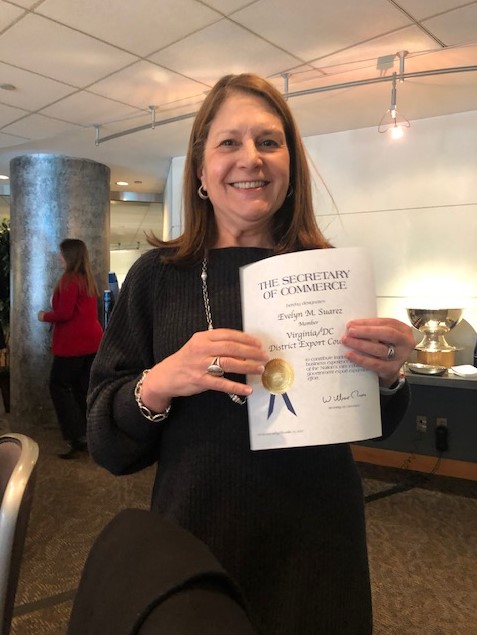Evelyn Suarez joined with Li Li, Partner at Dentons Beijing to present: How Chinese Exporters Respond to the U.S. Investigation on Forced Labor, Taking UFLPA as an Example. The presentation took place on April 17, 2023.

Evelyn Suarez joined with Li Li, Partner at Dentons Beijing to present: How Chinese Exporters Respond to the U.S. Investigation on Forced Labor, Taking UFLPA as an Example. The presentation took place on April 17, 2023.

Under the Uyghur Forced Labor Prevention Act (UFLPA), goods made wholly or in part in the Xinjian Uyghur Autonomous Region (XUAR) or by entities identified on the UFLPA Entity List are subject to a Rebuttable Presumption that the goods are made with forced labor and will be stopped at the border unless the importer can prove by clear and convincing evidence that the product was not made with forced labor. This applies to goods that may be produced in third countries that have constituent materials coming from Xinjiang. CBP has instituted enhanced early warning mechanism through its automated system that might indicate the goods are made in XUAR or by a UFLPA Entity.
This paper describes how a company can provide information and documentation to its customer who might be an importer or another company in the supply chain for goods destined to the U.S. The law specifies that cotton, tomatoes and polysilicon are to receive extra scrutiny and CBP has identified apparel and silica-based products, such as raw materials used to make aluminum alloys, silicones and polysilicon. Recently, CBP has sent notices to automotive-related companies that they suspect have ties to forced labor in XUAR. CBP states that aluminum sourced from XUAR may become a high priority material for UFLPA enforcement by CBP.
CBP will provide notice of enforcement action which might be in the form of a detention notice, exclusion notice or notice of seizure for flagged shipments. According to U.S. Customs and Border Protection Operational Guidance for Importers, issued on June 13, 2022, importers must provide CBP substantiation of the absence of inputs subject to the UFLPA by presenting the following type of documentation, as further detailed within the guidance:
Ultimately, to rebut the presumption, an importer must provide “clear and convincing” evidence that the goods are not the product of forced labor for CBP to determine that the goods are beyond the scope of UFLPA and to release the shipment. Companies might want to use available products and technology for: mapping, visibility and traceability; DNA or isotopic testing (approved by CBP for cotton); and even third-party testing. However, these products do not provide a silver bullet and the supplier must be prepared to provide the information and documentation described in this paper.
In order to minimize UFLPA enforcement risk, CBP recommends the following best practices to importers:
Cotton
Polysilicon
Tomatoes
We can assist your company to put together a package for your customers to address CBP’s concerns about forced labor in the supply chain and to be responsive to CBP’s requests. This is the only way a product identified as coming from XUAR will be able to enter the commerce of the U.S.
A December 12, 2019 Federal Register notice published by USTR informed the public that it was reviewing the action being taken in the Section 301 investigation involving the enforcement of the United States’ World Trade Organization (WTO) rights in the Large Civil Aircraft dispute. The notification includes two annexes: Annex I lists the specific products that are currently subject to additional duties of 10 percent to 25 percent, while Annex II lists products for which additional duties of up to 100 percent are proposed (but for which no additional duties have yet been imposed). Comments for Annex II Products closed January 13, 2020. Here is the USTR Federal Register notice with the two annexes.
Here’s an article I wrote for tradevistas.com about how the “Port of Virginia Put Suffolk on the Coffee Map.”

Proud to be part of the District Export Council for DC/VA serving U.S. companies engaged in international trade and investment.